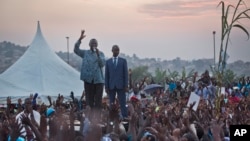Uganda's electoral commission plans to meet with both local and international poll observers on Monday ahead of the February 18 presidential, parliamentary and local elections.
The electoral officials say they will brief the poll monitors about preparations made so far to ensure the polls are free, transparent and credible. They also said the electoral commission would seek to inform the poll observers what is expected of them during the elections. The electoral body has so far approved about 2,000 poll observers who would be deployed across the country to monitor the elections.
“They have been coming in to pay courtesy calls to also ask a few preliminary questions. They have been around so we think they also have notes they have made through their observations since we accredited them, and on Monday we will share with them and to learn something from them,” said Jotham Taremwa, spokesman for the electoral commission. “
He denied media reports that there appears to be rising tension among supporters of the ruling National Resistance Movement (NRM) and opposition supporters from the Forum for Democratic Change (DFC) as well as supporters of independent candidate, Patrick Amama Mbabazi, who is a former prime minister.
Opposition supporters accuse the NRM of using state institutions including the police and other security agencies to intimidate and harass them in a bid to suppress opposition voter turnout in the upcoming polls.
Taremwa says the electoral commission has embarked on a nationwide campaign to educate prospective voters about their rights and responsibilities in the run up to the elections.
“We have a very good relationship with the Uganda police force, we work closely, and they have not disappointed us,” said Taremwa. “Politicians are bound to say anything, but we have come out as a commission to conduct public campaigns to ensure that everybody works for violent free polls and a peaceful elections."
He says the commission would be using the biometric system to administer the polls, which he says would ensure transparency and credibility of the elections.
“We think with that system in place the question of voter bribery or voter impersonation or voting more than once has been solved,” said Taremwa. “We have conducted enough voter education and we have intensified our voter education messages in all kinds of media. So we think the public is fully aware.”
Meanwhile, a latest opinion poll conducted by IPSOS Synovate shows incumbent President Yoweri Museveni will win the presidential election with 53 percent, while main challenger Dr. Kizza Besigye of the opposition Forum for Democratic Change (FDC) comes in second with 28 percent. The survey which was conducted in February 1-8 showed a two-person race with the 6 other presidential contenders recording less than 2 percent of those surveyed.
Watch video: Adding elections to Valentine’s Day






